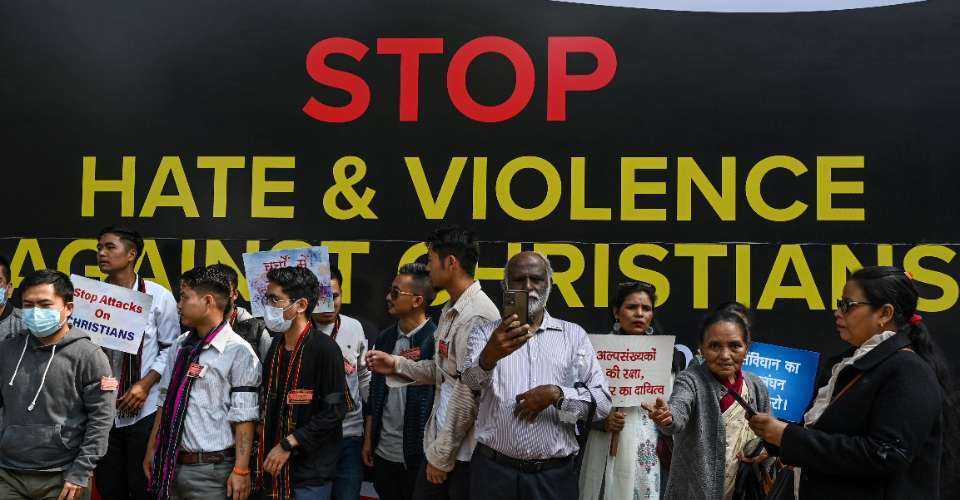
By Saji Thomas
Christians in India will look upon 2024 as a year that challenged their faith and resilience with increased hostility, internal conflicts, scandals, power struggles, and natural calamities.
Attacks against and harassment of Christians swelled this year amid growing hostility, particularly against those in remote villages of Hindu-dominated northern states, Christian leaders say.
January through September, Christians suffered 585 incidents, an all-time high, according to the United Christian Forum (UCF), which documents violence against Christians based on the information they receive through its helpline calls.
Hostility toward Christians increased as Prime Minister Narendra Modi won a third term in June, leading his Hindu-leaning Bharatiya Janata Party (BJP) in the national elections, albeit with a reduced majority.
The BJP and allied Hindu groups support the idea of making India a Hindu theocratic nation and oppose conversion activities and even missions in villages, projecting them as tactics to convert gullible tribal and socially poor villagers.
Northern Uttar Pradesh, the country’s most populous state, has become the worst place for Christians as the BJP-led state government added more teeth to its draconian anti-conversion law in August.
The amendment added a provision of life imprisonment or up to 20 years in jail for religious conversion and toughened the bail provisions. It also allowed anyone to complain about a law violation, changing the earlier provision that allowed only a victim of conversion or a close relative to do so.
Uttar Pradesh reported 156 of 585 anti-Christian incidents, the highest among India’s 28 states to report such cases. Scores of Christians are arrested on charges of violating the anti-conversion charges. Several of them continue in jail, waiting for bail.
In northeastern Manipur state, an ethnic violence that erupted on May 3, 2023, continues between minority indigenous Christians and the Meitei Hindu majority. Christian groups accuse the state’s BJP-led government of supporting violence against Christians.
The violence has so far killed at least 250 and displaced some 60,000, most of them Christians who live in government shelter homes, clueless as to when they can return to their homes that are either in ruins or burnt down.
With Hindu groups holding a firmer grip on political institutions, antagonism of Christians has spread across governing systems, with many taking legal measures to harass Christians and deprive them of the benefits they have enjoyed thus far.
India’s Supreme Court on Nov. 7 backed a 2014 federal Income Tax Department order requiring nuns and priests working in government-aided Christian schools to pay tax on their salaries.
The top court dismissed 93 appeals against the order. This ended a practice the British introduced in 1944, which exempted missionaries from paying taxes to promote education nationwide.
The Catholic Church runs over 50,000 educational institutions, including schools and 400 colleges, six universities, and six medical schools in India.
In another shocking proposal, the Madras High Court in southern Tamil Nadu state on Nov. 18 suggested the nation introduce a law to govern Church properties, like in the case of Hindus and Muslims.
The court observation came while hearing a series of graft allegations regarding property management by the Church of South India (CSI). This Protestant denomination inherited Anglican Church properties after India’s independence in 1947. The main accusation was that property was being sold off at below market value.
As well as the external challenges, the Church witnessed some internal conflicts and scandals.
The liturgy dispute in India’s Eastern rite Syro-Malabar Church hit the headlines. Most priests in the Archdiocese of Ernakulam-Angamaly refused to accept an official rubric for the Mass that required them to face the altar during the Eucharistic prayer.
Rebelling Catholics and priests in the archdiocese continue with the traditional Mass, during which the celebrant faces the congregation throughout. In July, the rebel priests agreed to celebrate the official Mass on certain occasions., resulting in a truce.
However, it was breached in October after apostolic administrator Bishop Bosco Puthur demanded and obtained a written undertaking from eight deacons stating that they would only celebrate the official Mass as a precondition for their priestly ordination.
The deacons were ordained but were not allowed to offer Mass, not even in their home parishes, because people opposed the official Mass.
In the embarrassing conflict, archdiocesan priests and people continue to boycott Puthur and his curia members.
Many Christian leaders and social media posts consider the liturgy dispute an expression of the internal power struggles among bishops. These struggles stem from regionalism and craving authority rather than concern about liturgy and spirituality.
Amid all the bad news, the Church did have one silver lining: George Jacob Koovakad, 51, became the first Indian priest directly elevated to the rank of cardinal. Pope Francis elevated the Eastern Rite Church member among 21 new cardinals on Dec. 7.
Another major event this year is the once-in-ten-year exposition of St Francis Xavier’s sacred relics, which opened on Nov. 21 in Old Goa, the former Portuguese capital in India. An estimated 8 million Catholics are expected for the 45-day-long event to venerate the remains of the Spanish Jesuit missionary who died four centuries ago.
The Church has also helped to provide succor for people trapped in calamities, especially floods and landslides.
Church officials in Kerala, with the help of Caritas India, the social arm of the Indian bishops, promised to build 100 houses for the survivors of landslides in the state’s Wayanad district, which on July 30 left more than 400 people dead and 200 missing.
Uttarakhand state, in northern India, witnessed cloudbursts that left 3,500 people displaced and 17 dead. In neighboring Himachal Pradesh, eight people were killed, and 45 were declared missing after houses, bridges, and roads were washed away in torrential rains.
Heavy rainfall and flooding in June in Assam state killed 109 people and inundated at least 1,325 villages in 19 districts, affecting over half a million people.
Caritas India helped flood victims by offering them basic amenities such as dried rations, tarpaulin, sanitary items, and clothes.
source : ucanews
